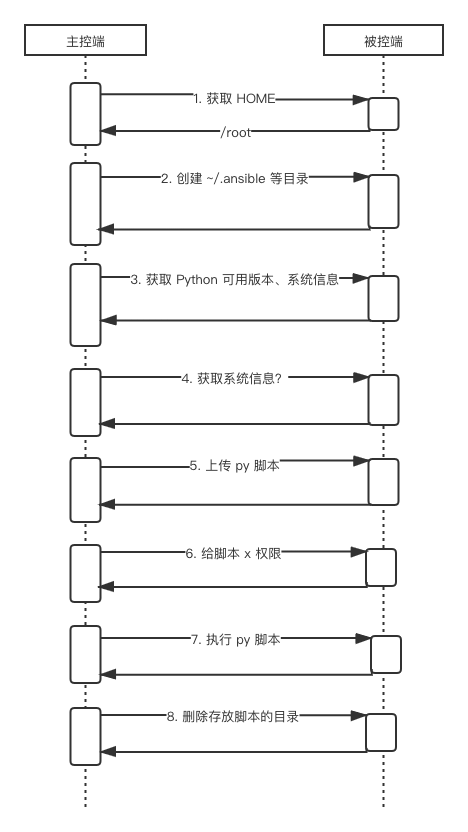1
2
3
4
5
6
7
8
9
10
11
12
13
14
15
16
17
18
19
20
21
22
23
24
25
26
27
28
29
30
31
32
33
34
35
36
37
38
39
40
41
42
43
44
45
46
| META: ran handlers
<9.134.124.159> ESTABLISH SSH CONNECTION FOR USER: root
<9.134.124.159> SSH: EXEC ssh -C -o ControlMaster=auto -o ControlPersist=60s -o Port=36000 -o KbdInteractiveAuthentication=no -o PreferredAuthentications=gssapi-with-mic,gssapi-keyex,hostbased,publickey -o PasswordAuthentication=no -o 'User="root"' -o ConnectTimeout=10 -o ControlPath=/Users/yangyu/.ansible/cp/4846fe66a5 9.134.124.159 '/bin/sh -c '"'"'echo ~root && sleep 0'"'"''
<9.134.124.159> (0, b'/root\n', b'')
<9.134.124.159> ESTABLISH SSH CONNECTION FOR USER: root
<9.134.124.159> SSH: EXEC ssh -C -o ControlMaster=auto -o ControlPersist=60s -o Port=36000 -o KbdInteractiveAuthentication=no -o PreferredAuthentications=gssapi-with-mic,gssapi-keyex,hostbased,publickey -o PasswordAuthentication=no -o 'User="root"' -o ConnectTimeout=10 -o ControlPath=/Users/yangyu/.ansible/cp/4846fe66a5 9.134.124.159 '/bin/sh -c '"'"'( umask 77 && mkdir -p "` echo /root/.ansible/tmp `"&& mkdir "` echo /root/.ansible/tmp/ansible-tmp-1599536717.558343-92837-98923700243036 `" && echo ansible-tmp-1599536717.558343-92837-98923700243036="` echo /root/.ansible/tmp/ansible-tmp-1599536717.558343-92837-98923700243036 `" ) && sleep 0'"'"''
<9.134.124.159> (0, b'ansible-tmp-1599536717.558343-92837-98923700243036=/root/.ansible/tmp/ansible-tmp-1599536717.558343-92837-98923700243036\n', b'')
<9.134.124.159> Attempting python interpreter discovery
<9.134.124.159> ESTABLISH SSH CONNECTION FOR USER: root
<9.134.124.159> SSH: EXEC ssh -C -o ControlMaster=auto -o ControlPersist=60s -o Port=36000 -o KbdInteractiveAuthentication=no -o PreferredAuthentications=gssapi-with-mic,gssapi-keyex,hostbased,publickey -o PasswordAuthentication=no -o 'User="root"' -o ConnectTimeout=10 -o ControlPath=/Users/yangyu/.ansible/cp/4846fe66a5 9.134.124.159 '/bin/sh -c '"'"'echo PLATFORM; uname; echo FOUND; command -v '"'"'"'"'"'"'"'"'/usr/bin/python'"'"'"'"'"'"'"'"'; command -v '"'"'"'"'"'"'"'"'python3.7'"'"'"'"'"'"'"'"'; command -v '"'"'"'"'"'"'"'"'python3.6'"'"'"'"'"'"'"'"'; command -v '"'"'"'"'"'"'"'"'python3.5'"'"'"'"'"'"'"'"'; command -v '"'"'"'"'"'"'"'"'python2.7'"'"'"'"'"'"'"'"'; command -v '"'"'"'"'"'"'"'"'python2.6'"'"'"'"'"'"'"'"'; command -v '"'"'"'"'"'"'"'"'/usr/libexec/platform-python'"'"'"'"'"'"'"'"'; command -v '"'"'"'"'"'"'"'"'/usr/bin/python3'"'"'"'"'"'"'"'"'; command -v '"'"'"'"'"'"'"'"'python'"'"'"'"'"'"'"'"'; echo ENDFOUND && sleep 0'"'"''
<9.134.124.159> (0, b'PLATFORM\nLinux\nFOUND\n/usr/bin/python\n/usr/bin/python3.6\n/usr/bin/python2.7\n/usr/bin/python2.6\n/usr/libexec/platform-python\n/usr/bin/python3\n/usr/bin/python\nENDFOUND\n', b'')
<9.134.124.159> ESTABLISH SSH CONNECTION FOR USER: root
<9.134.124.159> SSH: EXEC ssh -C -o ControlMaster=auto -o ControlPersist=60s -o Port=36000 -o KbdInteractiveAuthentication=no -o PreferredAuthentications=gssapi-with-mic,gssapi-keyex,hostbased,publickey -o PasswordAuthentication=no -o 'User="root"' -o ConnectTimeout=10 -o ControlPath=/Users/yangyu/.ansible/cp/4846fe66a5 9.134.124.159 '/bin/sh -c '"'"'/usr/bin/python && sleep 0'"'"''
<9.134.124.159> (0, b'{"osrelease_content": "NAME=\\"Tencent tlinux\\"\\nVERSION=\\"2.2 (Final)\\"\\nID=\\"tlinux\\"\\nID_LIKE=\\"rhel fedora centos\\"\\nVERSION_ID=\\"2.2\\"\\nPRETTY_NAME=\\"Tencent tlinux 2.2 (Final)\\"\\nANSI_COLOR=\\"0;31\\"\\nCPE_NAME=\\"cpe:/o:tlinux:linux:2\\"\\nHOME_URL=\\"http://tlinux.oa.com/\\"\\nBUG_REPORT_URL=\\"http://tapd.oa.com/tlinux/bugtrace/bugreports/my_view/\\"\\n\\n", "platform_dist_result": ["centos", "7.2", "Final"]}\n', b'')
Using module file /Users/yangyu/projects/ansible/lib/ansible/modules/command.py
<9.134.124.159> PUT /Users/yangyu/.ansible/tmp/ansible-local-9283485g9ot9_/tmpkr7p4e1t TO /root/.ansible/tmp/ansible-tmp-1599536717.558343-92837-98923700243036/AnsiballZ_command.py
<9.134.124.159> SSH: EXEC sftp -b - -C -o ControlMaster=auto -o ControlPersist=60s -o Port=36000 -o KbdInteractiveAuthentication=no -o PreferredAuthentications=gssapi-with-mic,gssapi-keyex,hostbased,publickey -o PasswordAuthentication=no -o 'User="root"' -o ConnectTimeout=10 -o ControlPath=/Users/yangyu/.ansible/cp/4846fe66a5 '[9.134.124.159]'
<9.134.124.159> (0, b'sftp> put /Users/yangyu/.ansible/tmp/ansible-local-9283485g9ot9_/tmpkr7p4e1t /root/.ansible/tmp/ansible-tmp-1599536717.558343-92837-98923700243036/AnsiballZ_command.py\n', b'')
<9.134.124.159> ESTABLISH SSH CONNECTION FOR USER: root
<9.134.124.159> SSH: EXEC ssh -C -o ControlMaster=auto -o ControlPersist=60s -o Port=36000 -o KbdInteractiveAuthentication=no -o PreferredAuthentications=gssapi-with-mic,gssapi-keyex,hostbased,publickey -o PasswordAuthentication=no -o 'User="root"' -o ConnectTimeout=10 -o ControlPath=/Users/yangyu/.ansible/cp/4846fe66a5 9.134.124.159 '/bin/sh -c '"'"'chmod u+x /root/.ansible/tmp/ansible-tmp-1599536717.558343-92837-98923700243036/ /root/.ansible/tmp/ansible-tmp-1599536717.558343-92837-98923700243036/AnsiballZ_command.py && sleep 0'"'"''
<9.134.124.159> (0, b'', b'')
<9.134.124.159> ESTABLISH SSH CONNECTION FOR USER: root
<9.134.124.159> SSH: EXEC ssh -C -o ControlMaster=auto -o ControlPersist=60s -o Port=36000 -o KbdInteractiveAuthentication=no -o PreferredAuthentications=gssapi-with-mic,gssapi-keyex,hostbased,publickey -o PasswordAuthentication=no -o 'User="root"' -o ConnectTimeout=10 -o ControlPath=/Users/yangyu/.ansible/cp/4846fe66a5 -tt 9.134.124.159 '/bin/sh -c '"'"'/usr/bin/python /root/.ansible/tmp/ansible-tmp-1599536717.558343-92837-98923700243036/AnsiballZ_command.py && sleep 0'"'"''
<9.134.124.159> (0, b'\r\n{"changed": true, "end": "2020-09-08 11:45:53.183432", "stdout": "11.sh\\n11.zip\\nInstallHalyard.sh\\n[\\nabc.txt\\nagent.zip\\nbefore.txt\\ncloud-agent.log\\nclouddriver-prome.yaml\\nclouddriver.git?token=bd40137b365a6a789b7f5904cff87958ba5b158b\\nclouddriver.log\\ncoding-cd\\ncoding-cd-grpc.yaml\\nconfig_hub_oa_com.sh\\nconfig_vscode_server.sh\\ndemo\\ndemo.yaml\\ndev\\ndevopsAgent\\ndevopsDaemon\\nenable_internet_proxy.sh\\nfile.txt\\nfix_devcloud.logs\\ngeneric-aloe.txt\\nhi.db\\niProxy.sh\\nindex.html\\ninit_data_disk.sh\\ninit_devcloud_remote.sh\\ninstall.sh\\ninstallAgent.sh\\ninstall_ift.sh\\njre\\njre.zip\\nlog.txt\\nlogs\\npost-script.text\\nprome.yaml\\npush_master\\nrevert_image_source.sh\\nruntime\\nset_linux_welcome.sh\\nstart.sh\\nstop.sh\\nszx\\ntelegraf.conf\\nuninstall.sh\\nworker-agent.jar\\nworkspace", "cmd": ["ls", "/root"], "rc": 0, "start": "2020-09-08 11:45:53.178756", "stderr": "", "delta": "0:00:00.004676", "invocation": {"module_args": {"creates": null, "executable": null, "_uses_shell": false, "strip_empty_ends": true, "_raw_params": "ls /root", "removes": null, "argv": null, "warn": false, "chdir": null, "stdin_add_newline": true, "stdin": null}}}\r\n', b'Shared connection to 9.134.124.159 closed.\r\n')
<9.134.124.159> ESTABLISH SSH CONNECTION FOR USER: root
<9.134.124.159> SSH: EXEC ssh -C -o ControlMaster=auto -o ControlPersist=60s -o Port=36000 -o KbdInteractiveAuthentication=no -o PreferredAuthentications=gssapi-with-mic,gssapi-keyex,hostbased,publickey -o PasswordAuthentication=no -o 'User="root"' -o ConnectTimeout=10 -o ControlPath=/Users/yangyu/.ansible/cp/4846fe66a5 9.134.124.159 '/bin/sh -c '"'"'rm -f -r /root/.ansible/tmp/ansible-tmp-1599536717.558343-92837-98923700243036/ > /dev/null 2>&1 && sleep 0'"'"''
<9.134.124.159> (0, b'', b'')
9.134.124.159 | CHANGED | rc=0 >>
11.sh
11.zip
InstallHalyard.sh
[
abc.txt
...
META: ran handlers
META: ran handlers
Process finished with exit code 0
|





